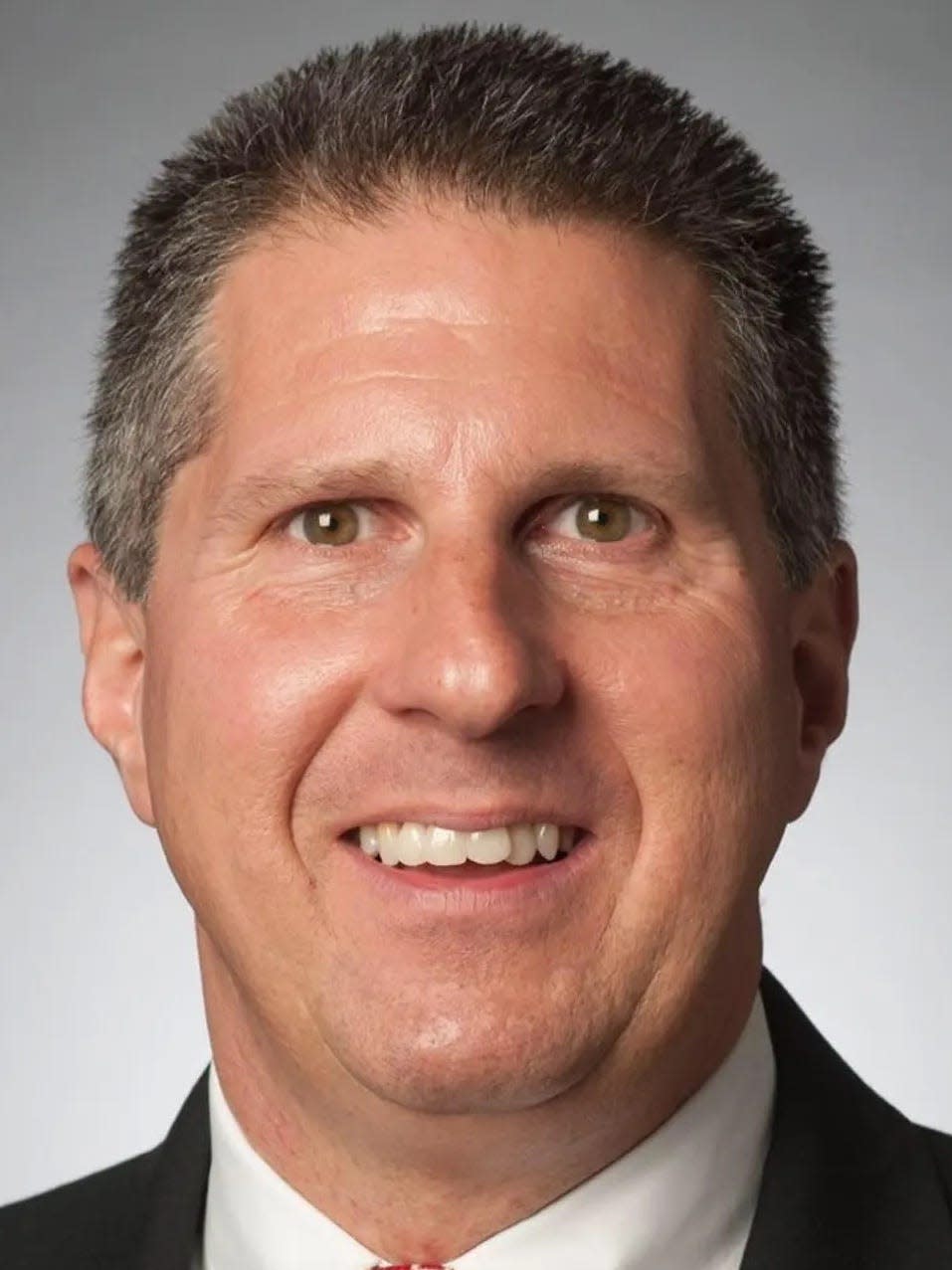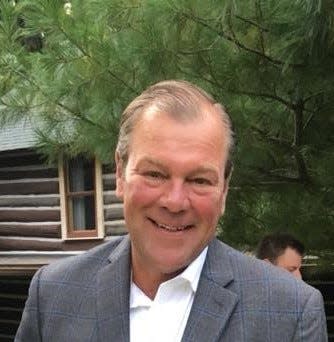Here's what to know about the candidates running for mayor of Glendale on April 2
On election day, April 2, voters in the City of Glendale will face a decision to either reelect current mayor Bryan Kennedy, or promote a newcomer who pledges to be tougher on crime in the city but has his own record with the justice system.
Kennedy has served in the role since he was first elected in 2015, and his opponent, lawn care business owner Steve Bruckner, is his first challenger in nine years. If elected, Kennedy said this would be his last term as mayor.
Bruckner's campaign has hinged on a promise to crack down on crime in Glendale, particularly retail theft and drug enforcement.
At the same time, Bruckner has a 1999 felony conviction for possessing and intending to distribute cocaine from when he was 39 years old, according to a criminal complaint obtained by the Journal Sentinel from the Milwaukee County Clerk of Circuit Court.
In a separate civil case from 2010, Bruckner was ordered to pay over $2,500 after state investigators found his lawn care business Showpiece Lawns, Inc. had misapplied pesticide chemicals on two occasions in Whitefish Bay and Wauwatosa, according to a separate civil complaint.
State and local laws prevent those with felonies from running for mayor, but when Bruckner decided in 2022 to run for Glendale mayor, he submitted an application to expunge his criminal record. In March of 2023, he obtained the pardon for the criminal case from Gov. Tony Evers.
Asked whether these cases undermine his message on crime, Bruckner said he wants other people committing crimes to learn the lesson he had to after he was arrested.
Here's what to know about the candidates' backgrounds and views:
Bryan Kennedy

Background: Outside of his role as mayor, Kennedy has operated multiple business and government relations companies since 2014, recently under Minding My Own Business, LLC. Before he was elected in 2015, Kennedy served on the Glendale-River Hills School Board between 2007 and 2017. He also holds a Ph.D. in Latin American Studies from the University of North Carolina at Chapel Hill, and he was a professor at the University of Wisconsin–Milwaukee between 2001 and 2010. He served three terms as president of the American Federation of Teachers-Wisconsin, a statewide teachers union of mainly higher education employees, from 2007 to 2013. In addition to serving as mayor, Kennedy serves as commissioner of the Milwaukee Metropolitan Sewerage District and also chairs the Milwaukee County Intergovernmental Cooperation Council, composed of the county executive and the 19 mayors and village presidents in Milwaukee County.
Supporters: Kennedy is endorsed by Milwaukee County Executive David Crowley, Shorewood Village President Anne McKaig, Bayside Village president Eido Walney, and the Milwaukee Area Labor Council. Additionally, all six members of the common council signed Kennedy's nomination papers in his support.
Website: www.kennedyforglendalemayor.com
Projects Kennedy has undertaken as mayor: economic stability, supporting businesses and community engagement
Ahead of the next election, Kennedy wants Glendale residents to know what he's been able to accomplish over his three terms as mayor, in particular his work to improve the city's economic stability, support its growing business community and bring residents together.
Since Kennedy took over as mayor in 2015, Glendale has reduced the debt it took on to finance the cost of developments in three Tax Incremental Districts, including Bayshore, from $109 million to just over $10 million, according to the meeting minutes from city's Joint Review Board.
Kennedy said his work bringing more businesses to the city raised Glendale's gross equalized value on the business side, allowing the tax rate to fall across the board for everyone.
When he was first elected, around 40% of Glendale's tax revenue came from business properties, he said. Almost a decade later, that figure is at 49%.
During that same period, the tax rate per $1,000 of assessed value on a property fell from $7.66 to $6.99, according to the city's 2024 budget summary report.
As mayor, Kennedy said he's worked hard to help turn Bayshore into a thriving shopping center and living community. In 2017, the mall was faced with foreclosure and lenders indicated they would likely sell it. Kennedy helped convince the developer to reinvest in Bayshore.
"I could have been the mayor who watched the city go bankrupt over a $70 million bond that we could not pay. Instead, we now see Bayshore’s redevelopment and can be excited that it is thriving again."
Kennedy said he's also focus on increasing the number of community building event opportunities in Glendale for residents to get to know one another ― expanding the city's Fourth of July celebrations, lengthening the Maslowski Park concert series and launching the Root Beer Bash.
Next year will mark the city's 75th anniversary, and Kennedy is working on planning city events for every month of 2025.
Kennedy said a fourth term is necessary to see Silver Spring roadway redesign projects
If elected, Kennedy said this would be his last term as mayor.
When he first entered the office, the city was on the precipice of a transition period in city government. Within Kennedy's first term, the city's administrator, clerk, treasurer, executive assistant and police chief all retired. During his second term, the city's attorney, director of public works and community development director retired.
He said it took a lot of work and flexibility to keep things steady at city hall throughout the changeovers, but that over the last decade, he's witnessed city government grow into a fast-acting, cohesive team.
A project he'd like to see through is a joint redesign and redevelopment project with the City of Milwaukee along Silver Spring Drive from 27th Street to the Milwaukee River. Glendale has already secured $8 million for the project, $4 million from Gwen Moore's office and $3.9 million from the state from a block grant program administered through the bipartisan infrastructure bill.
Kennedy is hopeful to see the Silver Spring roadway redesign through to completion, because he sees it as a pilot for what the city could do on a number of other major roads in the city like Green Bay and Good Hope where speeding and reckless driving are prevalent.
The redesign will make Silver Spring safer by installing impediments along the surface of the road, adding segregated bike and pedestrian areas and creating a bus rapid transit lane, Kennedy said.
At the state level, Kennedy hopes to continue lobbying for a bill that would require inspections for parking garages like the one proposed by Rep. Darrin Madison last session. The bill sought to prevent parking garage collapses like the one that took a chunk out of Bayshore mall's garage in February 2023.
Kennedy's approach to public safety emphasizes prevention through redesign
In response to Bruckner's strategy of building a heavier police presences throughout the city, Kennedy said the city has already tried this and that his opponent doesn't have concrete plans to implement what he's promising
Kennedy has supported budget increases for the police department every year he's been in office. He noted that violent crime in Glendale dropped 7% in 2023 and the city saw a significant drop ― 65% ― in auto thefts, according to the Glendale Police Department's 2023 report.
To Kennedy, the next logical step is to redesign the roadways to make it more difficult for infractions to occur.
He said his opponent may not understand the way the North Shore's policing is rooted in collaboration with neighboring communities.
"My opponent knows one thing, and it's battering ram," Kennedy said. A one-size-fits-all approach to crime won't address the complexities and intricacies of the existing system, he said.
Last month, Kennedy held a meeting between Milwaukee County Sheriff Denita Ball and local officials to discuss crime from a multijurisdictional standpoint and set objectives for improving communication between entities.
Steve Bruckner

Background: Bruckner has been a business owner of several companies, including Showpiece Lawns, throughout Glendale where he's lived for most of his life. Early in Bruckner's life, he was a newspaper carrier for the Milwaukee Sentinel. From 1982 to 1984, he operated a chimney cleaning business called Kleen Sweep, which he closed down to move to Philadelphia. After moving back to Glendale, he sold another company, Green Valley Lawns, in 2002. In 1999, Bruckner received a felony conviction for possessing and intending to distribute cocaine. In a separate civil case from 2010, Bruckner was ordered to pay over $2,500 after state investigators found Showpiece Lawns had misapplied pesticide chemicals. State and local laws prevent those with felonies from running for mayor, but when Bruckner decided to run in 2022, he applied for and obtained a pardon from Gov. Tony Evers in March 2023. (Read more about this from Bruckner below.) Bruckner is also involved with philanthropy through his membership with the Freemason, Shriner and Elks organizations.
Supporters: Bruckner is not seeking endorsements
Website: www.facebook.com/BrucknerforMayor
What does Bruckner have to say about his own criminal history?
Ahead of this story's release, Bruckner addressed the drug conviction in a Facebook post March 14:
"Those of you that have known me for a long time know that I have never hidden from this bad chapter in my life," he said. "I have totally owned and admitted the poor decisions I made 25 years ago and never looked back. In the last 25 years, I’ve worked hard to be a good and productive citizen in our community."
Bruckner main campaign message focuses on crime
Bruckner is now mostly retired and said the idea to run for mayor came about while joking around with friends. Living along the border of Glendale and the City of Milwaukee, Bruckner said his campaign is rooted in a desire to address experiences of hearing gunshots and witnessing reckless driving.
His strategy for addressing crime in Glendale starts with having conversations with local police officers and the city's fire and police commission to identify the biggest concerns and needs.
But he's already concerned that people arrested for retail and property theft aren't learning the lesson he had to learn when he was arrested for the cocaine felony. One of the biggest issues Bruckner sees is that the "catch and release" strategy isn't working to prevent people from committing crimes again.
He admitted that a mayor doesn't have the authority to tell the district attorney or county judges what to do, but said more accountability is needed.
Generally, he believes having more police officers at Bayshore will help fix the problem.
He also hopes to crack down on code enforcement violations and drug trafficking at hotels in the city.
Bruckner isn't dialed into council meetings, wants less park, bike, pedestrian projects
Bruckner has attended a total of four council meetings, but said they were all "boring." While he agrees it's important to have "everybody on the same team," he took issue with the prevalence of unanimous votes and wants less consensus.
At the same time, Bruckner said he frequently blocks people who challenge his views from his campaign's Facebook page.
He questioned Kennedy's commitment to the job, pointing to several other seats Kennedy has campaigned for while mayor of Glendale, including Wisconsin State Assembly District 10 in 2022.
Because Bruckner's campaign is built around crime, he didn't have much to say on other issues in the city.
But asked about his approach to economic and fiscal aspects of the job, he described himself as "fiscally conservative." He said the biggest waste of money in the city now is on parks and bike and pedestrian projects, such as the one on Silver Spring.
Driving around the city, Bruckner said he doesn't see many people using mass transit or parks. He said he doesn't use them either.
Contact Claudia Levens at [email protected]. Follow her on X at @levensc13.
This article originally appeared on Milwaukee Journal Sentinel: 2024 Election: Glendale Mayor Bryan Kennedy faces Steve Bruckner
